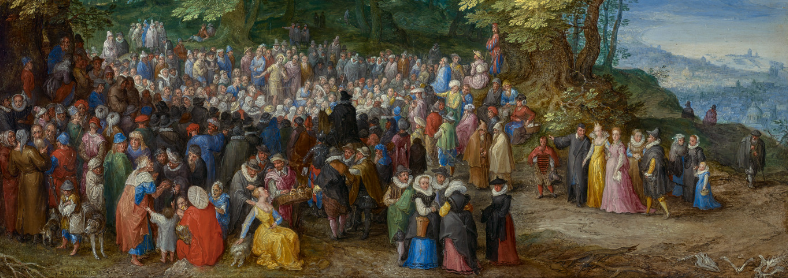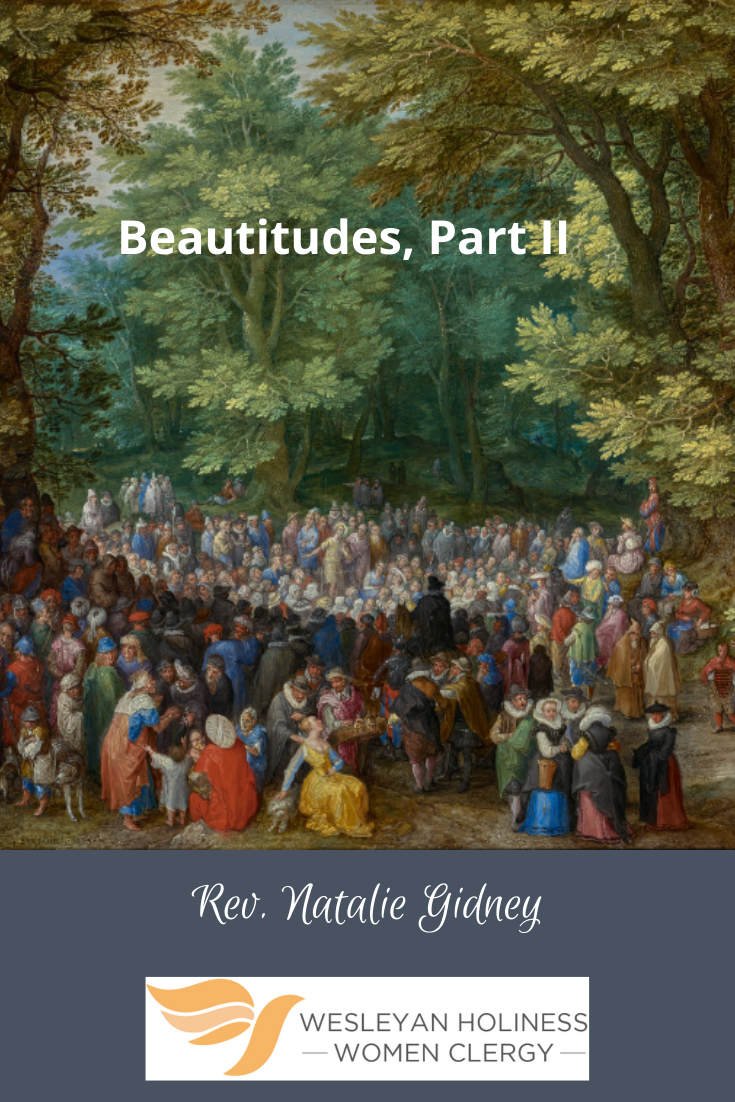Rev. Natalie Gidney is an ordained minister in the Atlantic District of The Wesleyan Church. She has four published books in the area of discipleship and is passionate to see everyone explore, discover, and grow into their God given calling. She loves words! Reading and writing, preaching and teaching are true passions in her life. Whether in conversation one on one or in front of a crowd, she enjoys talking about transformation through Christ. She and her husband have three adult daughters.
Beatitudes Part II
Rev. Natalie Gidney • April 27, 2022 | WHWC
You Are Blessed to Be a Blessing

As we continue to take a deep dive into the Beatitudes, I want to encourage you to go back and read An Introduction to the Beatitudes and take some time to process that—if you haven’t already—then return to this installment.
When Jesus spoke these words and preached this sermon, He was teaching His followers how to live in the sinful world they found themselves in: the same kind of sinful world we still find ourselves in today. Now, it is important to be aware that there is a dispute whether this teaching was for the twelve disciples only, or the wider crowd who had followed Jesus to hear Him preach at this time. Regardless of which it was, there is so much we can learn about being followers of Jesus as preacher women.
Before we dive in, let’s review the Scripture verses that we will examine in this particular post. We are going to look specifically at Matthew 5:3-5 and discuss what this means and how we can live it out.
“Blessed are the poor in spirit, for theirs is the kingdom of heaven.
Blessed are those who mourn, for they will be comforted.
Blessed are the meek, for they will inherit the earth.”1 NRSV
Why The Beatitudes?
The Beatitudes are a series of blessings that Jesus shares for Kingdom citizens. We live in a broken world, unlike the world of perfection that was created for us and that we were created to live in. When sin entered the world, everything was affected in a negative way. Our bodies began to break down (illness and diseases began to take a toll), our relationships began to break down, our minds, hearts, and feelings all began to suffer distortion from the effects of sin and the fall; but God had a plan.
Even in all this, Jesus does not leave us as abandoned children. In this passage, we see the blessings—shall I say—of the brokenness we encounter. Not because of anything that we’ve done, but because of who He is, we are able to have hope and be blessed because of the character and person of Jesus. It doesn’t depend on our goodness, praise the Lord, or our happiness or state of mind, but it is fully dependent on who He is. Isn’t that exciting?!
A Study of Words
Words take on many meanings in the English language. For instance, if we think of the word love: we can love our families, our friends, our food, or our pets. The love we feel for our spouse or our friend is very different, yet we use the same word. Our love for our favorite food is different from the love we have for our pets. Yet we use the same word.
Looking again at the above passage, we see the repetition of the word blessed. Any time there is repetition, we should take note and investigate further. The word blessed (in this passage) is translated from the Greek word makarios which means “supremely blest, fortunate, well off, happy.”2 So when we consider this as the fuller meaning of blessed, let’s jump back and reread that passage of Scripture again.
When I read those verses, it is a bit shocking at first. Jesus’ words tear down all the lies the world is trying to teach me. Think about it, this is what the world tells you: you’ll be well off if you make more money, you’ll be well off if you live in a bigger house, drive a bigger car, you’ll be happy if you just take that exotic vacation, go to the spa, get your hair or nails done, eat at that restaurant, you’ll be supremely blessed if you lose that weight or get a fatter bank account…I will stop here. You fill in whatever lies you are encountering that say you will be supremely blest, fortunate, well off or happy.
Jesus turns the world upside right in His words and promises to us. The wonderfully freeing truth we have in the Beatitudes is that they are not a checklist of to dos and rules to hem us in, keep us in line, or that we must check off. The Beatitudes are words given to us as grace, dripping like honey from a honeycomb with blessing and hope in a desperate and broken world.
This is the way Christians are called to live in community with one another; as Kingdom citizens, extending grace upon grace, even when we’re experiencing difficult and the most trying of times. Speaking these words of grace over someone, demonstrating them by living them out in your family, church gathering, and community bring hope and peace to a tired and broken person or community of people.
Blessed Are the Poor in Spirit
Poverty is not something any of us desire. Yet, Jesus, in all His wisdom, starts these blessings saying that we are blessed if we are poor in spirit. The world, now and historically, has had a pride issue. If we look back through time and even within our own circles today, we can see the toll pride and even independence takes on us personally and on those around us. Wars, dominance, racism, misogyny, entitlement, and many more things, are all rooted in pride.
Being poor in spirit is having the pride stripped away, allowing pride to be removed and instead of clawing for and striving to be out front, on top, or hurting others to get what we want; it’s about building others up, allowing others to be in the spotlight, giving a hand up to someone else and cheering them on as they run faster and farther than us.
It’s letting go of our claim to what we think we deserve or what’s fair. Being poor in spirit is letting go of the independence that we pride ourselves in and listening to learn and grow rather than to respond. Jesus tells us that the kingdom of heaven is for those who are poor in spirit.
Blessed Are Those Who Mourn
Our culture does not do this well. Let’s be honest about it: grief and lack of mourning are taking a toll on people. The pandemic that has been with us for the past two+ years has caused a lot of people a lot of loss in a lot of ways. Family members and friends are no longer here with us. Family and friends do not gather unrestricted and uninhibited anymore. Families and friends are being affected by the polarization our world is experiencing on so many topics and levels.
There has been rampant sin in our world, our communities, our churches, our families, and maybe even in ourselves that we must address. To do so, we must first admit to it, truly understanding that pride is an abomination and we need cleansing from it. Then we must confess it, telling God that we have a problem and cannot fix it on our own. Finally, we must receive forgiveness and release from it, accepting the forgiveness that Jesus offers freely to all who will accept it. Oh Lord, help us mourn, first over our personal sin then our corporate sin. If you are reading this and say you are without sin, maybe you are, but maybe go to Jesus first and see what He says.
Mourning deeply over our brokenness and sin, grieving the pain and distance it has caused will bring us into the place where Jesus can bring an entire wholeness and fullness to us, but we must mourn first. When we mourn we are not left alone. Jesus is with us through the power of the Holy Spirit and we will be comforted.
There is nothing that we cannot bring to Him, no sin has us too far gone that He can’t forgive, heal, restore, and make us new. What peace we have, what comfort the Healer brings. We simply need to come and lay it before Him: mourn, grieve, pour out all the junk. Give it to Him and be filled when you receive His comfort.
Blessed Are the Meek
We often think of weak when we think of the word meek, but that is far from what is meant. If we look at Scripture, we see that Moses is described as meek. Meekness, in the truest sense of the word, describes someone who trusts God. To be a Kingdom citizen and especially a Kingdom leader: preacher sister, we must learn to be meek.
Trusting God with every aspect of your ministry and life just as Moses did is what Jesus is asking us to do. Learning to surrender, even in the face of accusation and negativity like Jesus did, trusting God to be your defender is the way of Kingdom leadership. No, it’s not easy, but Jesus tells us that those who are meek will inherit the earth.
Personal Reflection
- As you have read through these three Beatitudes, which one speaks most to you in your life and context right now?
- Is there something Jesus is speaking to you personally that He wants to accomplish in and through you that you may be avoiding or putting on a shelf in your mind to deal with at another time?
- What if you take that one thing and let God have His way within you and truly hear what He has to say?
- Are you ready to take the dive into the deep and allow Him to transform you for His glory and to see His Kingdom come and His will be done, first in you?
Please remember, preacher woman, you are not alone. You are blessed to, in turn, be a blessing. You are part of a community at Wesleyan Holiness Women Clergy who will support you and encourage you to grow in your calling and your holiness. We are not meant to live static and neutral lives but to step out in faith, grow deep roots and good branches, blossom and produce good fruit for the Kingdom, all within a community of support. We exist to serve one another. If you’re not already a part of this community, won’t you reach out and be part of it? You, my dear sister may just be an answer to another woman's prayer.
Resources
1 https://www.biblegateway.com/passage/?search=Matthew+5%3A3-5&version=NRSV
2 Strong, James. The New Strong’s Complete Dictionary of Bible Words. Nashville, TN: Thomas Nelson Publishers, 1996. p.654

Enjoyed this article? Connect with us on one of our social media platforms. Share it and forward it to a friend:




